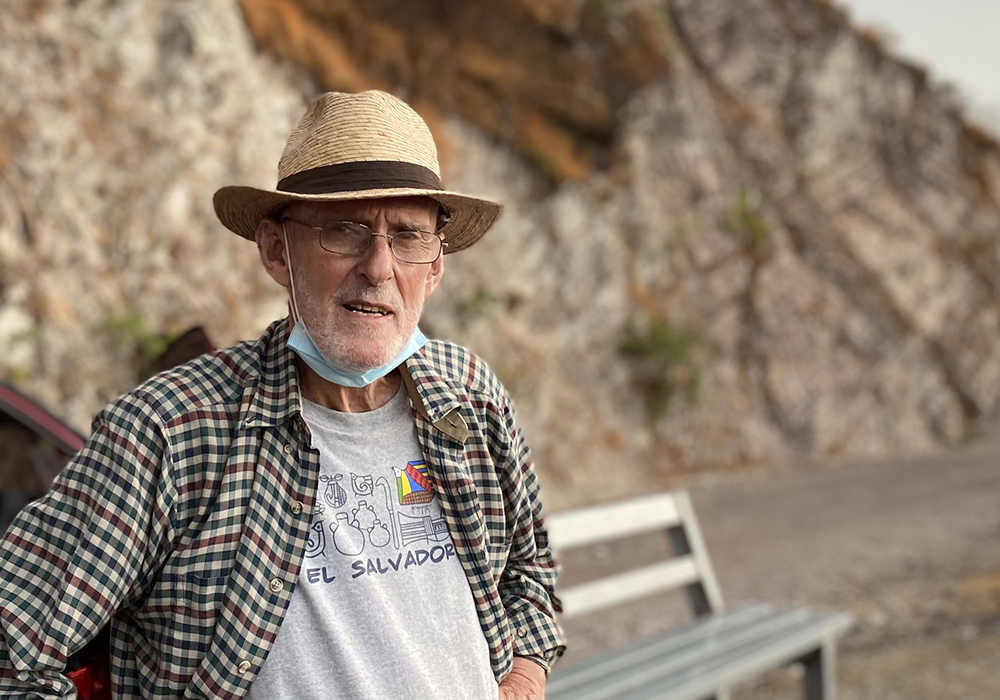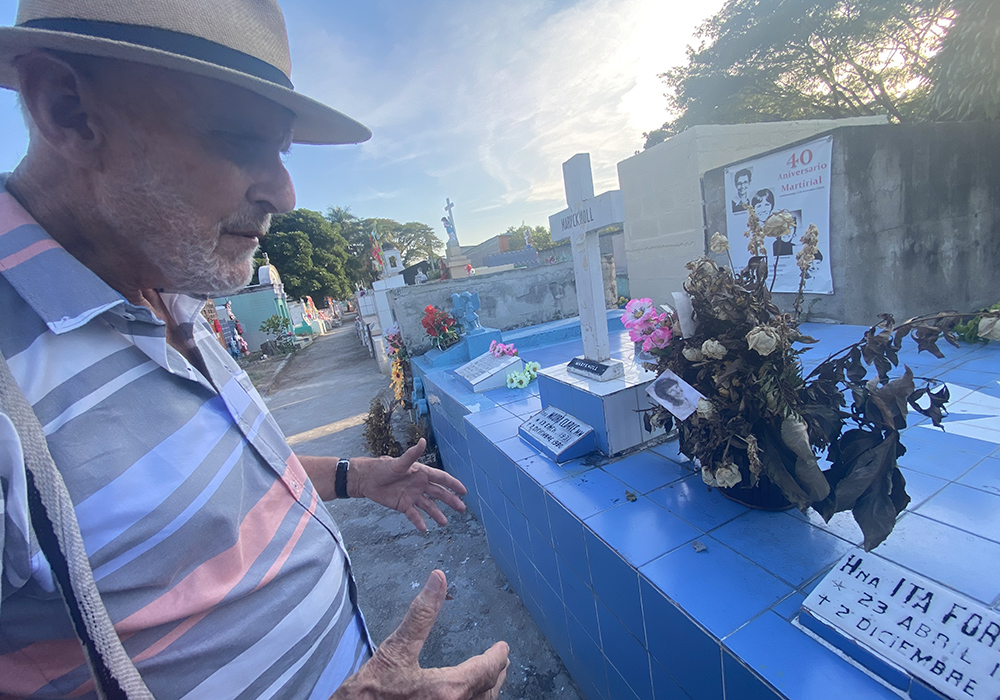
Franciscan Fr. Brendan Forde takes a break on his way home to Las Vueltas, Chalatenango in northern El Salvador, April 13, 2021. Forde, an Irish missionary friar, was living and serving in Las Vueltas but died July 8 during a visit to his native Ireland. (NCR photo/Rhina Guidos)
Franciscan Fr. Brendan Forde, an Irish missionary who lived through some of the most turbulent conflicts of 20th-century Latin America, including a military dictatorship in Chile and the war in El Salvador, died July 8 in his native Ireland. He was 79.
"For 40+ years he accompanied those in danger and in need in Latin America. A humble unsung hero," tweeted Mary Lawlor, United Nations special rapporteur on human rights defenders, July 9.
Forde spent his last years serving the poor in the hamlet of Las Vueltas in the northern province of Chalatenango, El Salvador, a poor, rural region heavily battered during the country's civil conflict of more than two decades. He first landed there in 1984 after being kicked out of Chile by military strongman Augusto Pinochet a year earlier.
"He had been home on holidays from El Salvador when he took ill," wrote the Franciscans of Dublin July 8 on their Facebook page, adding that "throughout his life, Brendan lived his Franciscan vocation among the poorest in several Latin American countries. There he served the people with loving generosity and also great courage in times of war and oppression."
He worked in leper communities in the Amazon, war-torn Colombia as well as in Indigenous communities in Honduras and Guatemala. His work in Chile was the subject of the Irish documentary "Friar in Blue Jeans."
Advertisement
Lawlor, who has worked with human rights defenders around the world for decades, wrote that she first knew of Forde after he received death threats for accompanying a community in Colombia that didn't want to take sides in the country's conflict.
"He told me how after the massacre of five adults and three children, a young woman with special needs in the community collected the body parts and put the dead back together again," she wrote on the webpage for the office of the Special Rapporteur on Human Rights Defenders.
His late sister, Barbara Forde, became an advocate for peace in Colombia after seeing the plight of the communities her brother served.
In a 2016 radio interview with WGBO, Forde was asked, "What do you accomplish in these countries?"
"I've never felt I accomplished very much. I accompanied the people," he answered.

Franciscan Father Brendan Forde prays Dec. 15, 2022, before the tombs of U.S. Maryknoll Sisters Ita Ford, Maura Clarke, and Carla Piette, buried in the cemetery of Chalatenango, in northern El Salvador, close to where he lived and served. The Irish missionary friar who lived through some of the most turbulent conflicts of 20th-century Latin America, died July 8 during a visit to his native Ireland. (NCR photo/Rhina Guidos)
Along with two other priests, Forde was expelled from Chile in 1983, accused of inciting violence after taking part in a silent march toward a church after the disappearance and presumed killing of a young man who had opposed Pinochet. The government escorted the priests to the airport, not allowing them to take any belongings, except for their passports.
In a June 28 ceremony at the Embassy of Chile in Ireland honoring the expelled priests' humanitarian work, Irish president Michael D. Higgins recalled that Forde "had opted out of living in a traditional friary in downtown Santiago and instead built a cardboard and timber hut at the city's edge," living as his neighbors did in the poorest part of Santiago before he was expelled.
In a Mass celebrated July 8 at the parish where he last served, which was livestreamed online, the rural community lamented his passing far from them and carried the straw hat he wore when he would walk with them to the mountains to pray and sing during the environmental Via Crucis he loved to lead, his walking cane and sandals as the gifts for the offertory. Among the small community of Las Vueltas, he did what knew best: minister during conflict.

Franciscan Fr. Brendan Forde, left, listens during Mass May 14, 2019, with members of the Diocese of Chalatenango at the site of a massacre in an area known as Las Aradas in northern El Salvador. Forde, an Irish missionary friar who lived through some of the most turbulent conflicts of 20th-century Latin America, died July 8 in his native Ireland. (NCR photo/Courtesy of Diocese of Chalatenango/Roberto Rivas)
In an April 2021 interview in Las Vueltas, Forde said that during war, you're not concerned with doing great things but the great thing is "trying to make things more human for everybody and to bring joy" in the middle of madness. He recalled an incident in which the townsfolk dropped by to warn him not to go outside because there was a group of dead bodies that soldiers had left on a road near the church.
But he said he grew worried after having seen a few days earlier pigs eating bodies that had been left on the road like garbage. Even though he could have been killed, he went out to the road, grabbed some towels and cleaned some of the bodies as best as he could because he wanted to restore their dignity, he said, then called the men from a nearby village to help him bury them.
They moved the bodies to a corn field and "we gave them a Mass," he recalled. The brother of one of the dead showed him a letter written to his mother, telling her that "Pedro died but, Mami, don't be worried because Padre Bernardo is there and he said the prayers … don't be sad."
"They were the small things that gave you a sense that you were doing something," he said.
A great fan of soccer, he recalled being detained by Salvadoran soldiers during an important day for the Irish as they played to qualify for the 1990 World Cup. Soldiers were accusing him of transporting bullets for the rebels but when he saw the time of day, he asked them if he could pull out his shortwave radio to listen to the results.
"I said to them [the soldiers], 'Don't get nervous…I'm going to pull out a radio.' They start looking. I turn on the radio and the sports came and it was the BBC from London and they (the broadcasters) said, 'It's a great day for the Irish,' " he recalled.
They allowed him to go free.
At the Mass in Las Vueltas, Fr. Adrian Mejia, who was baptized as a baby by Forde, said he was an example of the persecution Christians hear of in Matthew 5:10: "Blessed are they which are persecuted for righteousness' sake: for theirs is the kingdom of heaven. Blessed are you when men shall revile you, and persecute you. Blessed are you when they insult you and persecute you and utter every kind of evil against you [falsely] because of me."
The gentle Franciscan "with a spirit of valor" was one who did not look away from the crucified Christ, Mejia said, and wouldn't want others to turn their gaze away from those who are crucified. Mejia recalled that shortly after he was ordained in 2021, he told him to always care for what is valuable, sacred to the church before conflict begins.
"And in all that, it's human beings we have to guard with our lives," Mejia recalled. "Father was a martyr, in a different way than we're normally used to, but he lived it through the difficult experience of someone who carries out God's will."







